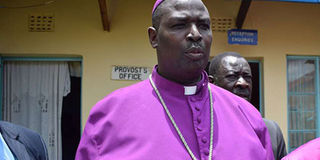Reduce number of church drives; you won’t need to call big donors

Anglican Church of Kenya Archbishop Jackson ole Sapit. He has said Kenyan churches should end the “hype” with which they accept donations from politicians. PHOTO | FILE | NATION MEDIA GROUP
What you need to know:
Troublesome charismatic movements' raison d’être seems to be to fleece their flock by promising them heaven even if they have to bankrupt themselves.
But what could Kenyan religious leaders possibly say about material possessions if they never question the source of this largesse?
They are all hedging their bets. They do not want to condemn donations to the church wholesale.
At the same time, they have been under severe attack by Kenyans who believe the donations are the proceeds of corruption.
This entire week, an epic battle between Church and Mammon has raged. This has been a battle between those who believe that the church of Christ should steer away from the pursuit of money, while the other is adamant that the smell of dirty money is only in the nostrils of hypocrites. It appears that the former have taken to heart the biblical exhortation to Christians: “No man can serve two masters … You cannot serve God and Mammon”.
PROTESTATIONS
In the middle ages (described as the period between 500 and 1500AD), Mammon was recognised as the god of wealth and profit in its negative connotations, and the homily in Apostle Matthew’s Gospel was probably as a result of age-old practices that were contemptible then, and are still beneath contempt today. But it will never do to condemn the church for seeking material independence, which can never be attained unless with the generous contributions of worshippers. Incidentally, Matthew is the patron saint of tax collectors and accountants, so he knew what he was talking about.
It is not quite clear what our leading clerics are objecting to all of a sudden considering that seeking assistance from well-to-do worshippers is nothing to flagellate their own hides about — people of means have always donated sizeable amounts of money during church harambees and nobody has ever raised a voice. Therefore, one can detect a whiff of politics in the emerging protestations targeting one or two individuals for their well-publicised generosity, but then politics has a way of dirtying everything it touches.
In any case, coming from church leaders, this admonition is rather rich. Very few princes of the church have shied away from accepting donations of any kind and some of the money may not even have been used for God’s work. Indeed, whatever their shortcomings, our religious leaders are no worse than the Catholic popes and cardinals of old whose history would make most people cringe.
CONSCIENCE
According to historians, the so-called Renaissance period (between the 13th and 14th centuries) when popes also held temporal powers was coloured by so much evil that few Catholics today want to learn about it. Sexual orgies, pederasty, murder, assassinations, corruption, simony, and nepotism have always been part of the early Christian tradition.
On the other hand, the Catholic Church has had popes who tried to act as the conscience of nations. For instance, the current primate, Pope Francis, besides trying to deal with sexual depravity among bishops, archbishops and cardinals, has also been in the forefront in fighting social and economic inequities to the extent that he has been labelled the first Marxist Pope. There is no doubt we will hear a lot more from him as he tries to reform the Church. The same cannot be said of mainstream protestant churches, or the more troublesome charismatic movements whose raison d’être seems to be to fleece their flock by promising them heaven even if they have to bankrupt themselves.
But what could Kenyan religious leaders possibly say about material possessions if they never question the source of this largesse? They are all hedging their bets. They do not want to condemn donations to the church wholesale. At the same time, they have been under severe attack by Kenyans who believe the donations are the proceeds of corruption, even if no evidence is adduced to that effect. What they object to is ostentatious display of opulence during church fundraisers, and the introduction of politics at the pulpit. In this one, there is an element of hypocrisy; they could use the help, but they sure do not want to deal with the ethical issues surrounding the ways in which this money was acquired.
CONTRIBUTION
A possible solution to this conundrum is to strictly limit the huge number of church harambees that worshippers are subjected to every Sunday and other church holidays; they are altogether too many. On any Sunday, there is one kind of harambee or another. Nobody would object if the fund drives were held to build imposing edifices for the Lord and furnish them with elegant pulpits and comfortable seats for the worshippers. Nobody would feel bad if asked to contribute money for buying tents, furniture and food utensils which can be hired out to raise funds for church-related activities.
But if you are a villager without any regular source of income, yet every Sunday you are expected to contribute money for Church School, Church Youth, Women’s Guild, Men’s Fellowship, and Christian Education, on top of numerous other cesses, where are you expected to raise the money from? On such occasions, the villagers end up contributing Sh20 or Sh50 because that is all they can afford. Is it any wonder that some church leaders will always prefer to invite well-heeled individuals as chief guests? According to some, there is no “clean” or “dirty” money in the eyes of the Lord. In fact, one of them has gone as far as saying the church is “not a house of saints”. He is quite right of course; Kenyans know this only too well.
Mr Ngwiri is a consultant editor; [email protected]





